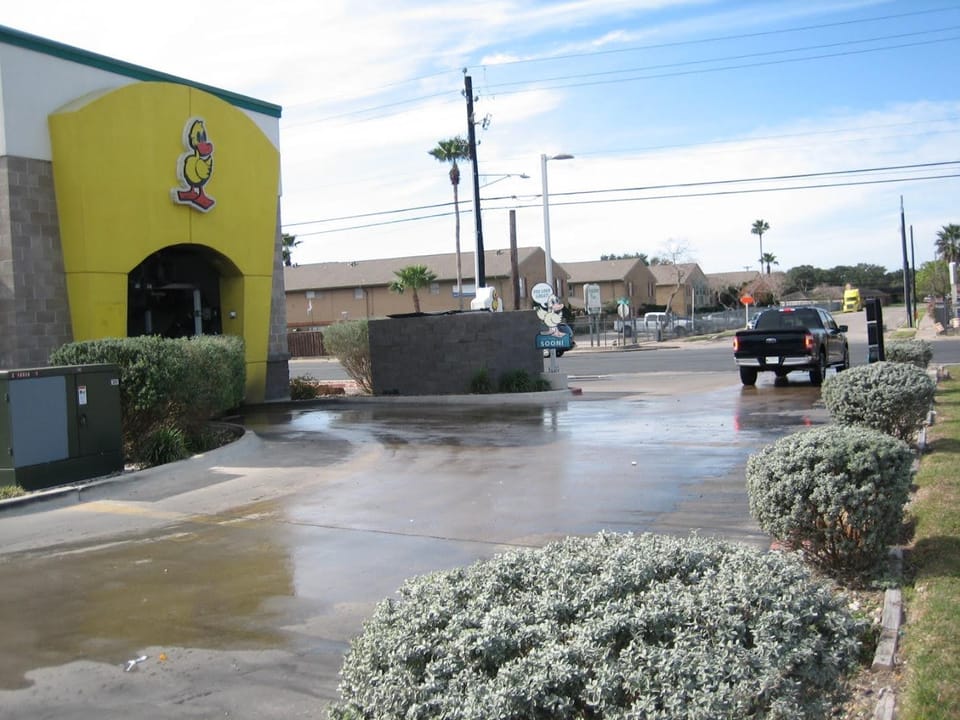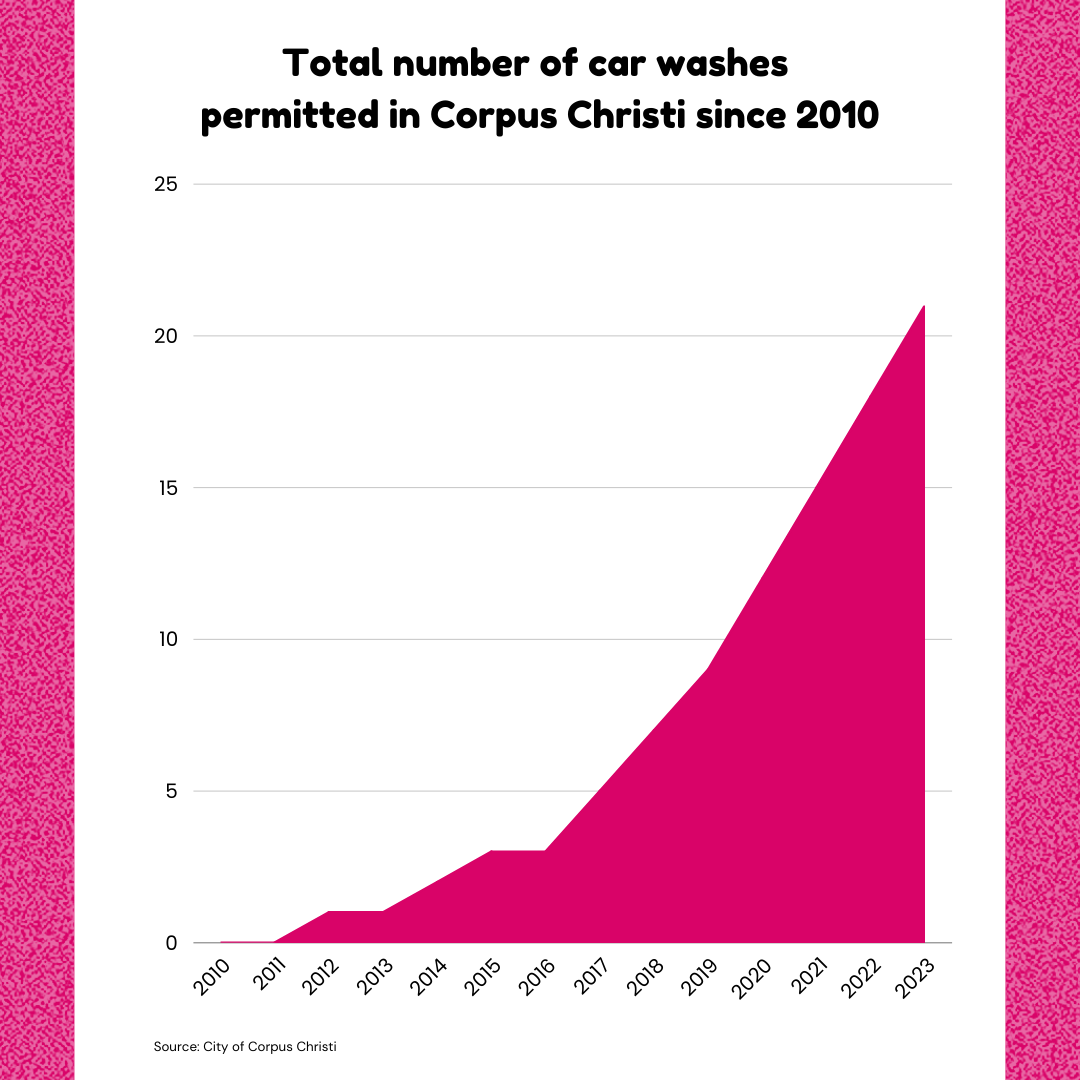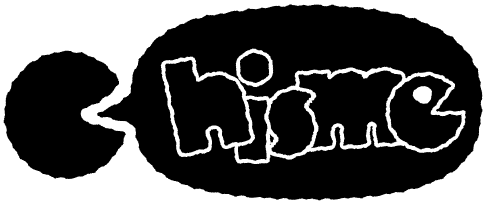We're in Drought, What's up With All the Quick Quacks?

By Julia Strong
Story highlights:
- Should the city stop permitting new car washes?
- Subscription-based car washes disenfranchise consumers and waste more water
- The city should regulate car washes to restrict water usage in line with residential use
Corpus Christi and the surrounding area have been in drought for more than two years. In those two years, we have seen a massive buildout of new car washes by different brands.
The City of Corpus Christi currently does not restrict water use for commercial car washes as they do residential water use during drought. That is the crux of the problem in a water-starved area like the Coastal Bend. We looked into what’s driving the car wash boom and its impacts on our water supply.
The number of building permits issued by the city for new commercial car washes began climbing after 2016 and has remained at three permits per year since 2020, according to records obtained from the City of Corpus Christi. Five new car washes have been permitted since the city implemented Stage 1 Water Restrictions, bringing the total number of new commercial car washes to 21 since 2010.

With new recycling technology, car washes reduce water use to typically 50 gallons a wash with 80% being reused. Some car washes claim reuse is as high as 99%. But upon close observation we found these claims to be more of a marketing or greenwashing campaign than facts.
During a City Council meeting this past January, City Manager Peter Zanoni echoed these marketing talking points. Council members asked Zanoni what was required of companies trying to build new car washes amid ongoing drought conditions.
The city is not limiting the number of new car washes being built but some companies recycle their water, Zanoni said, adding that commercial car wash businesses use less water per wash than the average person does when washing a car at home.
When asked whether the city inspects and regulates the water recycling and conservation practices of local car washes, Zanoni said only the businesses’ construction plans are reviewed by staff to determine the type of recycling technology used.
Zanoni pointed out that other cities have policies in place to incentivize car washes to cut back on water use.
“That’s something we can look into doing in the future,” Zanoni said.
Recycling car wash runoff doesn’t take into account that this is Texas, and Texans love to drive pickup trucks. When pickups go through automated car washes, the truck beds fill with water. When the trucks exit, the water in the truck bed dumps onto the pavement which later pours into the storm drain system on the streets.
The lack of city oversight of the water recycling and conservation practices of local car washes makes us wary and suspicious of any impact even the best technology may have as businesses are allowed to police themselves.
Quick Quack Infestation
Three of the five new car washes that have been permitted since we entered stage 1 drought restrictions were Quick Quacks, according to the city's data. Two Quick Quack locations aren't accounted for in the records provided by the city.
- North S. Staples
Address: 5329 S. Staples St, Corpus Christi, TX 78411 - Corpus Annaville
4427 Violet Road, Corpus Christi, TX 78410
The profits of the Roseville, California-based Quick Quack locations are siphoned out of the pockets of hard-working people in the Coastal Bend and deposited into banks in Northern California.
We obtained water use records for one Quick Quack location. In the last 12 months, they used 9,216,000 gallons of treated water or 25,249 gallons a day. Quick Quack lists 12 locations in our area on its website. If each location were to have the same use as the one we received water usage data for, just this one car wash company would consume 110,592,000 (111 million) gallons every year or 302,991 gallons every day.
A typical residential customer uses 72,000 gallons a year or 197 gallons a day.
In addition to being water guzzlers, modern commercial car washes employ very few people, which keeps business overhead low and profits high.
Profits vs. Conservation
Car washes are a $14 billion dollar industry in the U.S., and some estimate it will double by 2030. Unfettered and unregulated car wash booms in drought-stricken cities are profit-driven, which pits profit against conservation.
Most modern car washes follow a subscription-based business model because it’s the most profitable, but it also increases water consumption – by a lot.
On average, subscribed car wash members wash their vehicle 13 times more often than non-members. An industry insider said that when a non-member becomes a member, the car wash gets 10% more revenue.
About 80% of the revenue generated by modern car washes comes from subscriptions. A subscription-based service model ensures a steady stream of cash and consistently high revenues, which has led to consistent investments from private equity for the buildout.
Each location averages $1.5 million a year in revenue. One key to their success is automation.
In 2017, tax laws were passed to allow 100% depreciation for new car wash equipment. This was another incentive to automate the operations and eliminate employees. They have a 50% margin for earnings before taxes, interest and depreciation.
We can only guess the impact the car wash boom is having on our existing mom-and-pop car washes.
Car washes can be noisy and create more traffic. They take up valuable space that could be used for retail stores or restaurants. These stores and restaurants pay sales taxes. Most car washes pay little or no sales tax.
Some cities are fighting back and denying permits for car washes in prime locations.
This past June, the Laredo City Council unanimously approved a moratorium ordinance on new car wash application permits, according to reporting by the Laredo Morning Times.
The ordinance was issued to conserve water and impose a limit on the proximity of these establishments, according to reports. City staff said it’s making a concerted effort to encourage water conservation because car wash businesses can use up to 200,000 gallons of city water per month.
If you think we have enough car washes, or if you think car washes should also have their water restricted, let your elected officials know.
The last thing we want is to increase consumption of our precious water supply. A pay-as-you-go model makes more financial and conservational sense during a drought.
